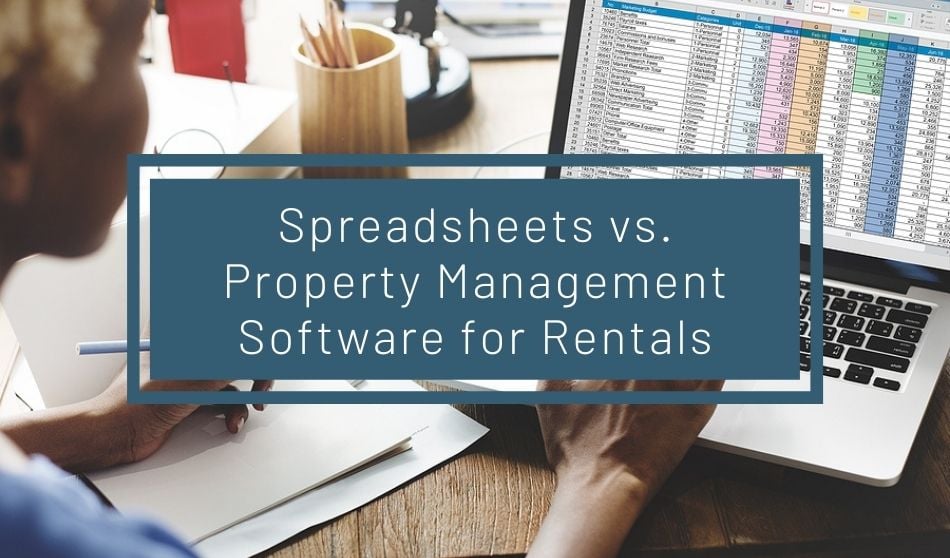
If you are looking to invest in a rental property, inherited rentals, or are working off older bookkeeping systems, you’ll want to compare all your data tracking options. If you’ve ever tracked data in spreadsheets you’ll want to review the pros and cons of using them for your property management needs before deciding on what’s best for your rental business.
Accounting Options for Rental Management
Just about every accounting tool will allow you to record rental income and expenses. Two of those systems to keep track of the accounting for your rental properties are spreadsheets and property management software.
Spreadsheets for Rental Property Bookkeeping
A step-up from using the old bound ledger books with hand-entered information, spreadsheets came on the scene 35 years ago but are still in use today for tracking numbers and calculations. The organized data in columns and rows are a convenient way to visualize information and perform mathematical functions.
Spreadsheet Pros
- Eye pleasing graphs and charts
- Placeholder for data
- Many options to choose from
- Familiar
Spreadsheet Cons
- Difficult to learn
- Vulnerable to data corruption
- Lack-luster protection
- Manual data-entry
- Prone to human error
Spreadsheets work well as a tool to manipulate data for analysis and are easy to create for list keeping. Although they’ve been around for decades and most people are familiar with the most simple functions, are spreadsheets the best tool for your rental accounting needs?
Can Spreadsheets Be Used For Property Management
Spreadsheets alone are not enough to handle the complexity of property management tasks and responsibilities. As a stand-alone tool to track income and expenses, a spreadsheet could be utilized but as a property management accounting tool, it lacks very important features a landlord will need such as:
- Double entry bookkeeping which allows landlords to reconcile their rental income with bank ledgers and property ledgers, which would be a tedious chore in a spreadsheet.
- Property management compliance standards such as state housing board audit requirements are not a feature within spreadsheets.
- Availability to create/share tenant statements connected to tenant ledgers in communicating with renters is missing meaning you’ll need a separate system or software for tenant related tasks like online payment processing, maintenance issues, and the like.
But if you’re a new landlord or looking to start your first investment into rental property, you may still be looking at spreadsheets as a resource tool while you investigate landlord software options or for importing data for analysis.
Although there are plenty of providers both as traditional spreadsheets and database options, the two main players are Google Sheets and Microsoft Excel.
Google Sheets for Rental Bookkeeping
Google Sheets was launched in 2006 as part of their suite of office tools in Google Drive, such as Google Docs, Google Presentations, etc. and mirror some of the same products and tools that Microsoft offers. With that, you’ll find both Google Sheets and Microsoft Excel have similar features. Here are a few differentiating pros and cons for comparing Google Sheets to Microsoft Excel:
Google Sheets Pros
- Can collaborate with anyone who has been given editor access.
- Usable from any smartphone, tablet, or computer.
- Free for personal use, $5/month for G-Suite for business
- Easy to use
- Built for collaboration
- Built-in revision history
- Real-time chat
Google Sheets Cons
- Loading time increases as data on a Google Sheet increases
- Less data visualization options
- Less customization and formulas
Microsoft Excel Spreadsheets for Rental Bookkeeping
Microsoft Excel is an application that allows you to perform calculations and make lists which help you analyze and sort information and track financial data. Again, you’ll find both Google Sheets and Microsoft Excel have core functionality that mirror each other. Here are a few differentiating pros and cons for comparing Microsoft Excel to Google Sheets:
Microsoft Excel Pros
- Advanced functionalities like locking cells and hiding formulas
- Unlimited storage space
- Options for data visualization
Microsoft Excel Cons
- Some Excel charts and graphics require a Microsoft 365 subscription ($6 – $22/month per user packaged in Microsoft 365 bundles)
- More difficult to learn
- Difficult to troubleshoot data-entry errors
- Different versions make collaboration difficult
To find out more about differences between the two leaders in spreadsheets check out this guide from Google:
Switching to Sheets from Microsoft Excel | Overview: Differences between Sheets and ExcelYou can find out more about the Excel spreadsheet application here: Microsoft Support Excel help & learning
You can learn more about the risks of using spreadsheets and spreadsheet compliance here: Spreadsheet Compliance: Controlling The Risks and Costs
Property Management Software for Rental Bookkeeping
Landlords have specific needs to help manage their rentals besides accounting and bookkeeping tasks that spreadsheets can’t accommodate.
Property Management Software Pros
- Reduces human error with automation of rental income and expense posting, bank synchronization, robust subuser permission settings, and three-way reconciliation reports.
- Audit trail: Errors are easy to find with search tools and transaction audit history.
- Robust data security and protection.
- Best landlord software will be designed for compliance to accounting best practices, tax regulations, and housing board standards.
- Property management software is built for trust accounting which allows property management companies to manage rentals for property owners.
Property Management Software Cons
- Although replete with many tools and features, often a property management software will lack customizable charts and graphs. You’ll likely need to export data from the software and import it into a spreadsheet tool to create data visualization.
- Built-in and add-on features may seem overwhelming if you are just starting out in the rental industry and only need basic functionality. Tip: look for a property management software that is easy to use with great client reviews for their support and training.
- Can be more expensive than a subscription to a suite with spreadsheets.
Takeaways: Property Management Software vs. Spreadsheets
Although there are pros and cons, each option above does have a stand-out quality to consider:
- Google Sheets are best overall for collaboration
- Microsoft Excel is best for statistical analysis and visualization
- Property management software, like Rentec Direct or other landlord and property management specific software, is best for compliance, automation, tenant relations, and bookkeeping accuracy
Best of Both Worlds | Property Management Software & Spreadsheets
If you’re looking for fancy charts and graphs and are familiar with Excel and Google Sheets, with great property management software you should be able to export any ledger, report, or data-set and import it into your favorite spreadsheet tool. From there, you can sort, arrange, and craft those pie charts and grafts for presentations and marketing giving you the best of both worlds.





